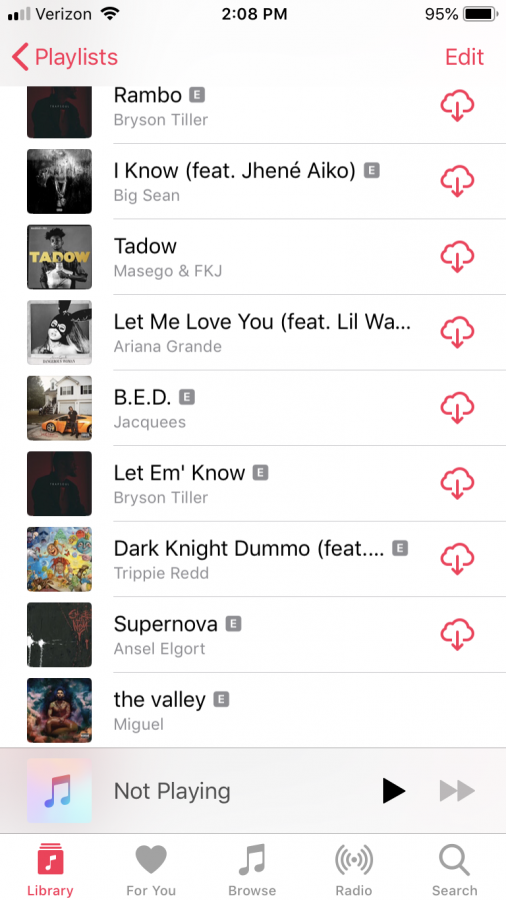Streaming Sales
What people may not know about her favorite music source
This is a student’s playlist on apple music.
November 7, 2018
Last year, the music industry made $43 billion dollars in revenue. That may seem substantial, but according to a study from Citigroup (via Pitchfork.com) only 12% of that revenue went to artists. Many are pushing the question, where does that money go? The majority of the money is said to go to distribution services like AM/FM radio, online platforms, and record labels. It is hard to compare this to previous years, where musicians had been paid more yet had less listeners.
However, the real question is how all musicians only made $5,160,000,000 last year? That number may seem like a lot, but consider all the musicians in the world, artists of all genres on different levels of fame. As stated in the new Nielsen Music Report, the average American now listens to music for just a little over 32 hours per week. If people are absorbing this music constantly, why are musicians making so little?
The answer is within the most commonly used music service: streaming music. Companies like Spotify, Apple Music, and Youtube Music are amongst the most commonly used to stream music sites. It seems so easy; low prices for free music every month!
“I mostly use Apple Music. It’s so easy, like all I have to worry about is using data,” said junior Mackenzie Hamilton, showing Triton Voice her everyday playlist. “I have premium so I can listen without ads, and I share my account with my family for $15.” The actual price for the family plan on Apple Music is $14.99 a month.
However, the problem is streaming sites may be too easy. In fact, the most frequently used streaming sites only pay a fraction of a cent per stream. As stated by Digital Music News, an artist needs to get 380,000 streams on Spotify in order to make the yearly minimum wage ($1,472.)
Many people and artists have begun striking against streaming services. Famously, pop star Taylor Swift waited months after Reputation’s release to allow her new album to be released on any streaming sites. Pushing the limit further, rapper JAY-Z made his own streaming site, Tidal. He released his, pop star Beyoncé’s, and hip-hop/rap star Kanye West’s music on Tidal.
Many argue that in order to support your favorite artist or be a real fan, you should buy their albums rather than stream them.
“I think the hardest thing I’ve ever done is deleting my Spotify account,” laughs junior Xander Heckman, as he showed Triton Voice his driving playlist. “But these people who are pouring their hearts and souls into songs they wrote are only making a fraction of a cent for one listen. And I ask myself, is that what I think art is worth?”
There are others who simply don’t care, though. “I use Spotify but not premium,” says junior Timmy Timmons. “I only have to listen to ads like, every 3 or 4 songs and sometimes I get the ad that says ‘listen to this ad to get 30 minutes of ad-free music.’ It’s totally worth it. I don’t care how much the artists make, half The Beatles are dead and they’re pretty much all I listen to.”
Timmons argues that he doesn’t know his favorite artists personally; therefore, he doesn’t care about the artist’s well-being and salary. It seems many music-listeners agree with Timmons, as streaming music is as popular as it is. The argument is that musicians have made their money; most musicians seen petitioning against streaming music are extremely wealthy. Besides, there’s more ways for those artists to make money, including and specifically performing on tour (hence why ticket prices have raised significantly.)
“It’s like, yes, I understand how much less they’re making,” Timmons said. “However, these artists don’t care about how much I’m making. These artists don’t know who I am. Plus, I think streaming services are really good promotions. I always get ads for big artists whenever I have my music on shuffle. And besides, if Spotify or Apple Music or whatever were really that bad for the music industry, how are they legal?”
However, though companies such as Apple Music or Spotify can help established artists promote their new albums via advertisement, the problem is with forthcoming musicians on the rise. It seems as though streaming music only gives famous musicians a platform, only advertising albums by already recognized artists. This makes it virtually impossible to really succeed. Music streaming services can only help them to supplement their already established influence and popularity.



